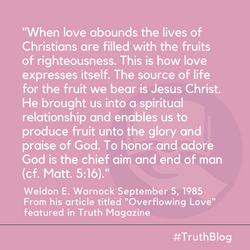Overflowing Love
Posted by Weldon E. Warnock on Jun. 1, 2022
| And this I pray, that your love may abound yet more and more in knowledge and in all judgment; that ye may approve things that are excellent; that ye may be sincere and without offence till the day of Christ. Being filled with the fruits of righteousness, which am by Jesus Christ, unto the glory and praise of God (Phil. 1:9-11). Here, in Paul's prayer for the Philippians there are three things to which I direct your attention: (1) Love must be properly directed, (2) the purposes of directed love, and (3) the expression of abounding love. The Direction Christians are to overflow with love or have an abundance of love. This is the meaning of the word "abounding." But this love must be channeled and it must act judiciously. An old trite saying is, "Love is blind." This certainly is not true in regard to Bible love. Love is discriminatory. It is to abound in knowledge and in all judgment or discernment. Love and knowledge are indispensable to one another. Paul wrote, "Knowledge puffeth up but charity edifieth" (1 Cor. 8:1). Knowledge must be mellowed with love. The same apostle also stated that if we have all knowledge and have not love, we are nothing (1 Cor. 13:2). On the other hand, love needs knowledge for guidance and discretion. The child of God needs to know whom to love and how to love. This he obtains from a study of the Word of God. The Bible tells us that we are to love God with all our heart, soul and mind and our neighbor as ourselves (Matt. 22:37-40). How we go about this is distinctly outlined in the Scriptures. The Purposes The reasons for discernible love are plainly set forth in verse 10. (1) The first reason is that ye may approve the things that are excellent. The word "approve" in the original language is the word which was used for testing metal or a coin to see whether it was pure or genuine or unalloyed. Discernible love tests the issues of life to see what is excellent or good. The footnote on this text states, "distinguish the things that differ." Love gives us keen perception (through the Bible) to eliminate the good from the bad, the important from the unimportant, the trivial from those things that really do matter. (2) The second reason for discernible love is that we may be sincere. The word "sincere" comes from two Latin words (sine, without) and (cera, wax) and means "without wax). Albert Barnes states that sina cera is "honey which is pure and transparent." The idea is that Christians are to be free from the impurities of the world. In the Greek, William Barclay stated that the word means either (a) that which is able to stand the test of sunshine by exposing it to the sun's bright light without any flaw appearing or (b) to whirl around in a sieve until all impurities are extracted (Philippians, Colossians, and Thessalonians, p. 19). Regardless which one is meant, the thought of purity is indicated and the word "pure" could correctly be used in the place of "sincere." In fact, some translations have "pure." (3) The third reason for discernible love is that we may be without offence. R.C.H. Lenski wrote that the debate regarding this word is "whether this is active or passive, offering damage or undamaged, 'uninjured' ourselves. Both meanings are found, here the context favors the latter" (St. Paul's Epistles to the Galatians, Ephesians, and Philippians, p. 719). Barclay interprets it to be damage to others. If Lenski is right it means that we are to live an undamaged life, that is, we are to avoid being morally injured by the sinful obstacles of life. If Barclay is correct, it means that we are not to say things or do things which cause others to stumble. Barclay made two good points in this connection when he wrote that there are people so harsh and austere that they in the end drive people away from Christianity, and secondly, there are people who are good, but they are so critical of others that they repel other people from goodness. We can profit from both views on Paul's usage of this word "offence" in verse 10. The Bible teaches both, although only one is meant in the passage under investigation. The Expression When love abounds the lives of Christians are filled with the fruits of righteousness. This is how love expresses itself. "Righteousness" stipulates the quality of the fruit, and being filled with this kind, it leaves no room for fruit of another character. The quality of righteousness is determined by the Lord's will or His commandments. The spiritual harvest will consist of "love, joy, peace, long-suffering, gentleness, goodness, faith, meekness, temperance" (Gal. 5:22-23), and as William Hendriksen suggested, "works which result from these dispositions." Jesus said, "Herein is my Father glorified, that ye bear much fruit; so shall ye be my disciples" (Jn. 15:8). Some of us are failing in fruit-bearing, especially the winning of souls to Christ. The source of life for the fruit we bear is Jesus Christ. He brought us into a spiritual relationship and enables us to produce fruit unto the glory and praise of God. To honor and adore God is the chief aim and end of man (cf. Matt. 5:16). From the September 5, 1985 publication of Truth Magazine |

 Back to Main Menu
Back to Main Menu
